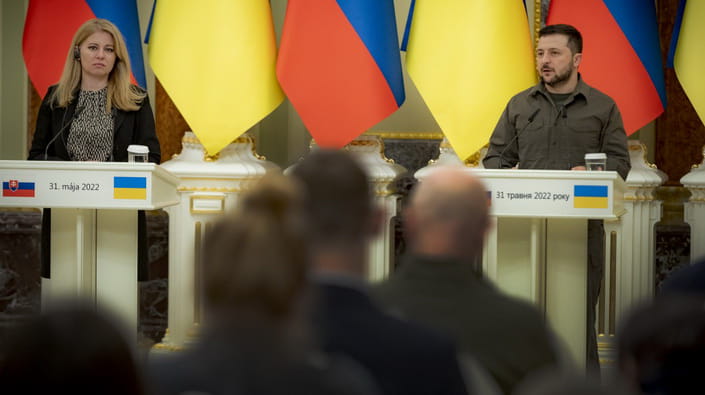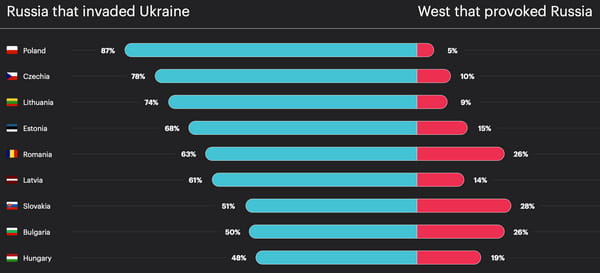Why Slovakia Has Become Ukraine's Major Ally in the EU and NATO

Polls indicate that Slovakia is one of the strongest pro-Russian countries in the EU. Meanwhile, their authorities are one of the friendliest to Ukraine. After February 24, the small country supported Ukraine as inevitably and powerfully as the US, the UK, and Poland.
What are the reasons for this new strong alliance between Ukraine and Slovakia?
Some will say that the countries were friends in the past. In 2014, Slovakia reversed gas for Ukraine to replace its contract with Gazprom. In 2017, two presidents launched visa liberalization between Ukraine and the EU on the Ukrainian-Slovak border.
But these were rather exceptions.
Support against the will of the people
Despite the absence of disputes (for example, over history or territory), relations between Ukraine and Slovakia were never meaningful. Both countries mentioned each other only occasionally, at the right time.
Before February 24, a single piece of news about Slovakia in Ukraine had not appeared for months. Instead, it has been plenty of them lately. And all positive.
Slovakia became the first country to provide Ukraine with long-range air defense. Slovakia supplies howitzers and other weapons. The President of Slovakia became one of the advocates for candidate status for Ukraine, etc.
All this is still happening, even though Slovak voters do not demand such actions from the authorities.
On the contrary, society tends to like Russia.
According to a Globsec survey, in 2021, 78% of Slovaks considered Russians their "Slavic brothers," and 42% called Russia a strategic partner. 56% of Slovaks say that NATO is provoking Russia, and only 41% say the opposite.
This conspiracy is fueled by all sorts of political parties. These are the Social Democrats Smer-SD, led by former longtime prime minister Robert Fico, the far-right L'SNS, the right-wing SNS, etc.
All these forces today, along with Russia's full-scale invasion of Ukraine, are turning Slovakia against the West, against supporting Ukraine in the war, against helping Ukrainian refugees, and against anti-Russian sanctions.
In March, the popular Slovak website SME announced the closure of SNS leader Andrej Danko's blog for spreading Russian disinformation about the Kremlin's aggression against Ukraine. The country's national security department shut down one of Slovakia's most popular conspiracy sites, Hlavne správy.
Despite all efforts to combat Russian disinformation, 28% of Slovaks still believe that the West provoked Russia to invade Ukraine. Another 16% believe that Ukraine is to blame for the war because it provoked Russia. Only 51% of Slovaks blame Russia for the invasion of Ukraine.

In addition, Slovakia depends on Russian gas (70-85%) and oil (100%, even more than Hungary).
How is then such a pro-Ukrainian position of official Bratislava possible?
Five reasons for the reversal of Bratislava
First
The current ruling coalition, despite its diversity, is pro-Western and anti-corruption. It does not oppose the previous government, led by Robert Fico and Peter Pellegrini, who liked to balance between the West and East. Foreign, Defense, and Prime Minister are particularly pro-European and pro-Western.
Second
Slovak President Zuzana Čaputova is even more pro-Western than others.
For them, supporting Ukraine means declaring that they are part of the West. Slovak pro-Russianism has not disappeared. It is simply not the government that represents it nowadays but the opposition.
Third
The current Slovak government remembers the Slovak economic miracle when the country underwent rapid reforms that led it to join the European Union. They understand that this is a window to reform for Ukraine. In addition, the authors of the Slovak economic miracle Mikulaš Dzurinda and Ivan Mikloš worked as advisers to the Ukrainian government until recently and still support Ukraine's European future.
Fourth
Civil society and the expert community are the massive support for the Slovak government. Their representatives are in power today. And experts, unlike the general public, are pro-Ukrainian.
The key advisers to President Čaputova are Ivan Mikloš and Jana Kobzova, who was in charge of Ukraine at the EED and Rasmussen Global. Adviser to the Prime Minister, Alexander Duleba, who knows Ukraine well and speaks Ukrainian fluently. He is considered to be the architect of Ukrainian-Slovak good neighborliness. It says that Ukraine's integration into the EU and NATO is in Slovakia's undeniable interest. First of all, it provokes the effect of the development of eastern Slovakia, which ceases to be the eastern border of the EU.
Fifth
Slovakia risked handing over its weapons to Ukraine but eventually became stronger. This boosted the rearmament with modern equipment with the support of the United States, such as the Patriot instead of the S-300 transferred to Kyiv. Poland followed the same path. On the other hand, Hungary, which has a similar need for rearmament, flatly refuses to supply Ukraine with weapons.
Consequences of Slovak aid
Slovakia cannot guarantee its current support for Ukraine forever. The country may retaliate against pro-Russian forces. Disgusting Russian propaganda, particularly against Ukraine, is strong in Slovakia. Many opposition politicians use Russian narratives to fight political opponents and intensify this propaganda.
Therefore, Ukraine must now use the moment for even greater rapprochement between the two countries.
The continuation of the D1 highway to the border with Ukraine, the completion of the reconstruction of the border checkpoint, and the launch of a high-speed railway between Slovakia and Ukraine could be a great start.
Neither Kyiv nor Bratislava have the funds to implement large-scale projects, but together they can attract them from international donors. The world's attention to Ukraine and the development of its ties with the EU creates opportunities worth seizing.
Dmytro Tuzhansky
Director of the Institute of Central European Strategy